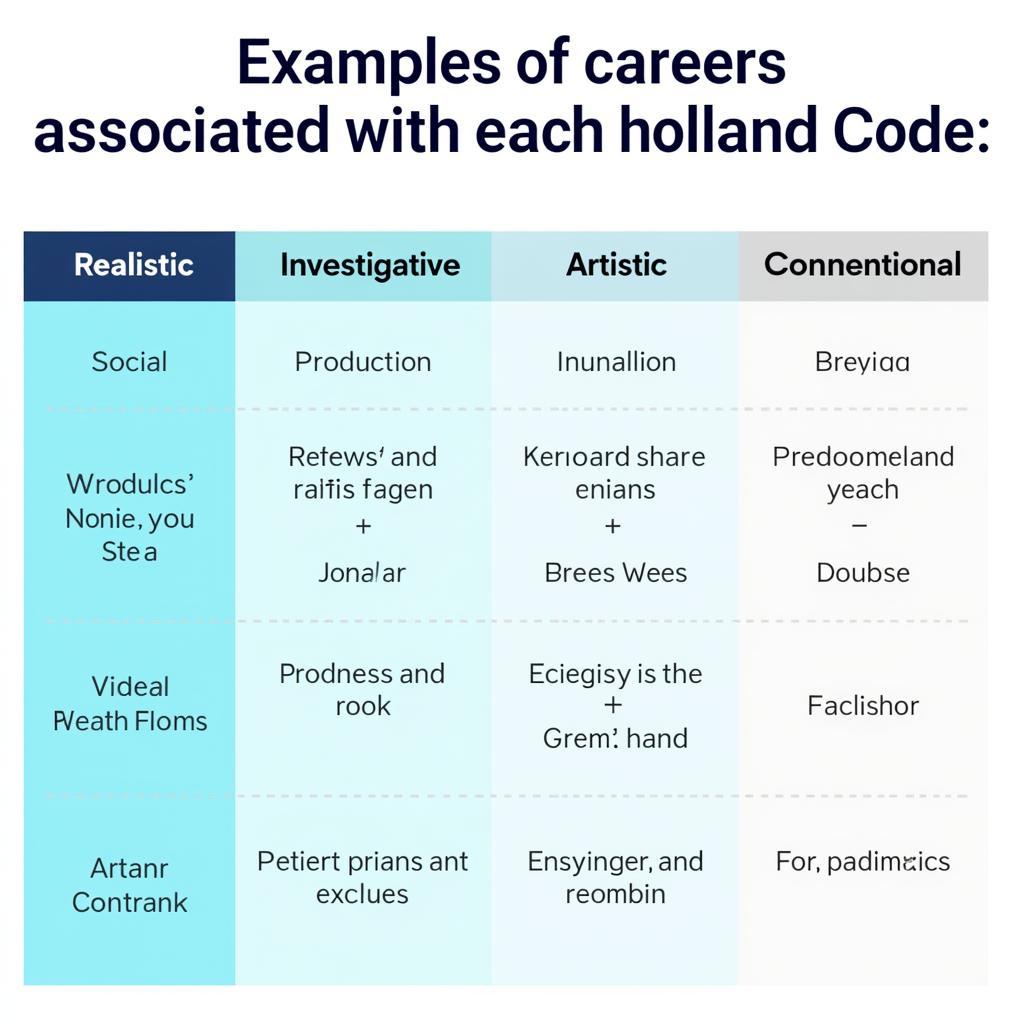John Holland’s career testing tool, the Self-Directed Search (SDS), helps individuals identify potential career paths based on their personality and interests. This tool, developed in the 1970s, remains a popular and effective method for career exploration today. It’s used by high school students, college students, and working professionals alike, guiding them towards fulfilling and suitable careers.
Understanding John Holland’s Theory and the SDS
The SDS is based on John Holland’s theory of vocational personalities and work environments. Holland proposed that people and work environments can be categorized into six personality types: Realistic (R), Investigative (I), Artistic (A), Social (S), Enterprising (E), and Conventional (C), often remembered by the acronym RIASEC. The SDS assesses your preferences for these six types and matches them with corresponding career fields.
How Does the SDS Work?
The SDS asks a series of questions about your aspirations, activities, competencies, and interests. Based on your responses, it generates a three-letter code representing your dominant personality types, for example, “ISA” or “REC.” This code is then used to identify occupations and work environments that are congruent with your personality.
Benefits of Using the SDS
The SDS offers several advantages: it’s self-administered, relatively inexpensive, and provides quick results. It can help you:
- Identify Potential Career Paths: Discover occupations you may not have considered before.
- Confirm Career Choices: Reinforce your current career direction or explore alternatives.
- Understand Your Work Personality: Gain insights into your strengths, weaknesses, and preferred work style.
- Make Informed Educational Decisions: Choose majors and courses that align with your career goals.
Exploring the Six Holland Codes
Each of the six Holland codes represents a distinct personality type and corresponding work environment. Let’s examine them in more detail:
- Realistic (R): Practical, hands-on individuals who enjoy working with tools and machinery. They prefer tangible results and often excel in technical fields.
- Investigative (I): Analytical and inquisitive individuals who enjoy solving problems and conducting research. They prefer intellectual challenges and often excel in scientific or academic fields.
- Artistic (A): Creative and expressive individuals who enjoy working with ideas and concepts. They prefer artistic mediums and often excel in creative fields.
- Social (S): Empathetic and supportive individuals who enjoy helping and interacting with others. They prefer social environments and often excel in helping professions.
- Enterprising (E): Energetic and persuasive individuals who enjoy leading and influencing others. They prefer competitive environments and often excel in business or sales.
- Conventional (C): Organized and detail-oriented individuals who enjoy working with data and procedures. They prefer structured environments and often excel in administrative or clerical fields.
Beyond the SDS: Other Career Assessments
While the SDS is a valuable tool, other career assessments can provide further insights. These include:
- Strong Interest Inventory: Focuses on your interests and compares them to those of people in various occupations.
- Myers-Briggs Type Indicator (MBTI): Assesses your personality preferences based on four dichotomies, offering insights into your work style and communication preferences.
- CareerOneStop: A free online resource sponsored by the U.S. Department of Labor, offering career exploration tools, training information, and job search resources.
“The SDS provides a solid foundation for career exploration,” says Dr. Eleanor Vance, a career counseling expert. “It’s a powerful starting point for individuals seeking clarity and direction in their career journey.”
Conclusion
John Holland’s Self-Directed Search (SDS) is a widely used and effective career testing tool. By understanding your Holland code and exploring related careers, you can make informed decisions about your future. The SDS is a valuable resource for anyone seeking clarity and direction in their career path.
FAQ
- How much does the SDS cost?
- How long does it take to complete the SDS?
- Where can I take the SDS?
- Is the SDS accurate?
- How can I interpret my SDS results?
- What if my SDS results are unclear?
- Are there online versions of the SDS?
Need further assistance? Contact us via WhatsApp: +1(641)206-8880, Email: [email protected] or visit us at 910 Cedar Lane, Chicago, IL 60605, USA. Our customer support team is available 24/7. We also recommend exploring our other articles on career exploration and automotive diagnostics on DiagFixPro.

